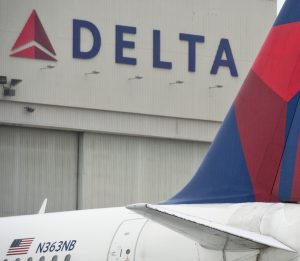 Delta Air Lines Inc. (NYSE:DAL) is being blamed as the reason for a selloff in leading U.S. airline stocks after announcing a steeper than expected decline in a key revenue figure. The company reported that for the second quarter, revenue for each seat flown one mile declined 5 percent. The previous forecast from the company estimated that the decline would be between 2.5 percent and 4.5 percent.
Delta Air Lines Inc. (NYSE:DAL) is being blamed as the reason for a selloff in leading U.S. airline stocks after announcing a steeper than expected decline in a key revenue figure. The company reported that for the second quarter, revenue for each seat flown one mile declined 5 percent. The previous forecast from the company estimated that the decline would be between 2.5 percent and 4.5 percent.
Delta’s average fare per mile fell 5.1 percent in the first quarter. The revenue per mile figure is an indicator of airline pricing power for investors. Delta is currently the nation’s second largest airline.
The disappointing performance has increased the pessimism weighing on airline stocks. In Tuesday afternoon trading, Delta was down 4.1 percent, American Airlines Group Inc. dropped 2.4 percent, United Continental Holdings lost 3.3 percent, and Southwest Airlines Co. fell 1.6 percent. A Bloomberg index of U.S. airlines fell 3 percent, with all 11 members declining.
Airlines have been adding flights and seats faster than the growth in demand. Delta estimated capacity expanded 3 percent in the second quarter. Sluggish demand for pricey last-minute business tickets has also been concerning investors.
Shares of Delta, United and American Air all recently hit their lowest levels since 2014. Shares of American, Delta and United all fell between 25 and 31 percent in the second quarter. Southwest declined more than 12 percent.
Delta cut its projected operating margin from a previous forecast of 21 percent to 23 percent to 17 percent in the second quarter. A decision to settle its remaining 2016 fuel hedges boosted fuel costs by $450 million. It lost another $274 million on hedges in the first three months of this year.
Fuel is the Atlanta-based airline’s second largest expense. The company had locked in fuel purchases at levels above the current market value. Fuel prices are up 60 percent from their January lows, but they’re still down 20 percent from a year ago. Because prices didn’t go as high as anticipated, the hedge was a loser.
Fuel hedges have hammered several large airlines. United Continental lost $604 million last year and Southwest lost $254 million, with the expectation to lose more than $1 billion on its hedges in the coming years. American Airlines is the only one out of the nation’s four biggest airlines that doesn’t do fuel hedges.
